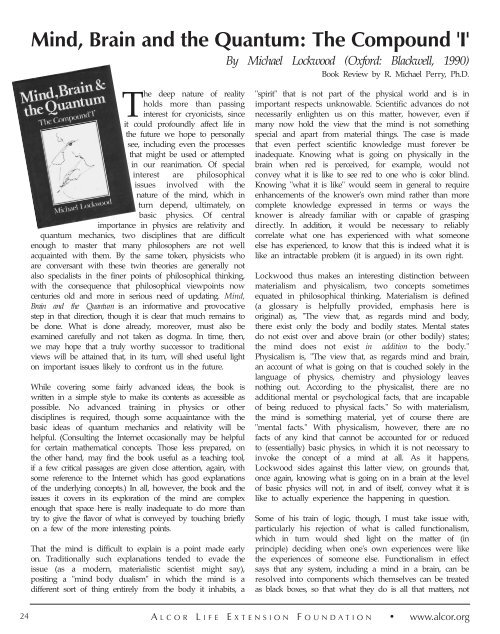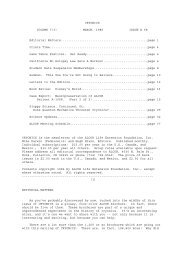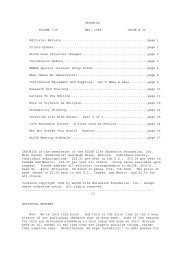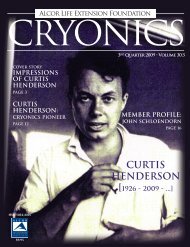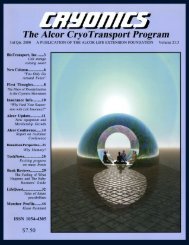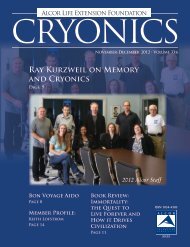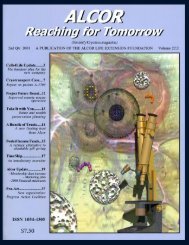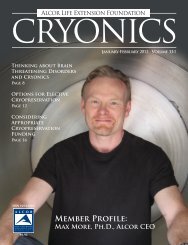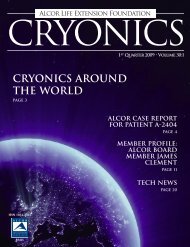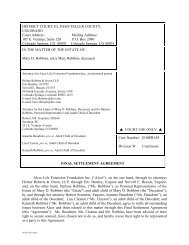Download PDF - Alcor Life Extension Foundation
Download PDF - Alcor Life Extension Foundation
Download PDF - Alcor Life Extension Foundation
You also want an ePaper? Increase the reach of your titles
YUMPU automatically turns print PDFs into web optimized ePapers that Google loves.
Mind, Brain and the Quantum: The Compound 'I'<br />
By Michael Lockwood (Oxford: Blackwell, 1990)<br />
Book Review by R. Michael Perry, Ph.D.<br />
The deep nature of reality<br />
holds more than passing<br />
interest for cryonicists, since<br />
it could profoundly affect life in<br />
the future we hope to personally<br />
see, including even the processes<br />
that might be used or attempted<br />
in our reanimation. Of special<br />
interest are philosophical<br />
issues involved with the<br />
nature of the mind, which in<br />
turn depend, ultimately, on<br />
basic physics. Of central<br />
importance in physics are relativity and<br />
quantum mechanics, two disciplines that are difficult<br />
enough to master that many philosophers are not well<br />
acquainted with them. By the same token, physicists who<br />
are conversant with these twin theories are generally not<br />
also specialists in the finer points of philosophical thinking,<br />
with the consequence that philosophical viewpoints now<br />
centuries old and more in serious need of updating. Mind,<br />
Brain and the Quantum is an informative and provocative<br />
step in that direction, though it is clear that much remains to<br />
be done. What is done already, moreover, must also be<br />
examined carefully and not taken as dogma. In time, then,<br />
we may hope that a truly worthy successor to traditional<br />
views will be attained that, in its turn, will shed useful light<br />
on important issues likely to confront us in the future.<br />
While covering some fairly advanced ideas, the book is<br />
written in a simple style to make its contents as accessible as<br />
possible. No advanced training in physics or other<br />
disciplines is required, though some acquaintance with the<br />
basic ideas of quantum mechanics and relativity will be<br />
helpful. (Consulting the Internet occasionally may be helpful<br />
for certain mathematical concepts. Those less prepared, on<br />
the other hand, may find the book useful as a teaching tool,<br />
if a few critical passages are given close attention, again, with<br />
some reference to the Internet which has good explanations<br />
of the underlying concepts.) In all, however, the book and the<br />
issues it covers in its exploration of the mind are complex<br />
enough that space here is really inadequate to do more than<br />
try to give the flavor of what is conveyed by touching briefly<br />
on a few of the more interesting points.<br />
That the mind is difficult to explain is a point made early<br />
on. Traditionally such explanations tended to evade the<br />
issue (as a modern, materialistic scientist might say),<br />
positing a "mind body dualism" in which the mind is a<br />
different sort of thing entirely from the body it inhabits, a<br />
"spirit" that is not part of the physical world and is in<br />
important respects unknowable. Scientific advances do not<br />
necessarily enlighten us on this matter, however, even if<br />
many now hold the view that the mind is not something<br />
special and apart from material things. The case is made<br />
that even perfect scientific knowledge must forever be<br />
inadequate. Knowing what is going on physically in the<br />
brain when red is perceived, for example, would not<br />
convey what it is like to see red to one who is color blind.<br />
Knowing "what it is like" would seem in general to require<br />
enhancements of the knower's own mind rather than more<br />
complete knowledge expressed in terms or ways the<br />
knower is already familiar with or capable of grasping<br />
directly. In addition, it would be necessary to reliably<br />
correlate what one has experienced with what someone<br />
else has experienced, to know that this is indeed what it is<br />
like an intractable problem (it is argued) in its own right.<br />
Lockwood thus makes an interesting distinction between<br />
materialism and physicalism, two concepts sometimes<br />
equated in philosophical thinking. Materialism is defined<br />
(a glossary is helpfully provided, emphasis here is<br />
original) as, "The view that, as regards mind and body,<br />
there exist only the body and bodily states. Mental states<br />
do not exist over and above brain (or other bodily) states;<br />
the mind does not exist in addition to the body."<br />
Physicalism is, "The view that, as regards mind and brain,<br />
an account of what is going on that is couched solely in the<br />
language of physics, chemistry and physiology leaves<br />
nothing out. According to the physicalist, there are no<br />
additional mental or psychological facts, that are incapable<br />
of being reduced to physical facts." So with materialism,<br />
the mind is something material, yet of course there are<br />
"mental facts." With physicalism, however, there are no<br />
facts of any kind that cannot be accounted for or reduced<br />
to (essentially) basic physics, in which it is not necessary to<br />
invoke the concept of a mind at all. As it happens,<br />
Lockwood sides against this latter view, on grounds that,<br />
once again, knowing what is going on in a brain at the level<br />
of basic physics will not, in and of itself, convey what it is<br />
like to actually experience the happening in question.<br />
Some of his train of logic, though, I must take issue with,<br />
particularly his rejection of what is called functionalism,<br />
which in turn would shed light on the matter of (in<br />
principle) deciding when one's own experiences were like<br />
the experiences of someone else. Functionalism in effect<br />
says that any system, including a mind in a brain, can be<br />
resolved into components which themselves can be treated<br />
as black boxes, so that what they do is all that matters, not<br />
24 A LCOR L IFE E XTENSION F OUNDATION • www.alcor.org


